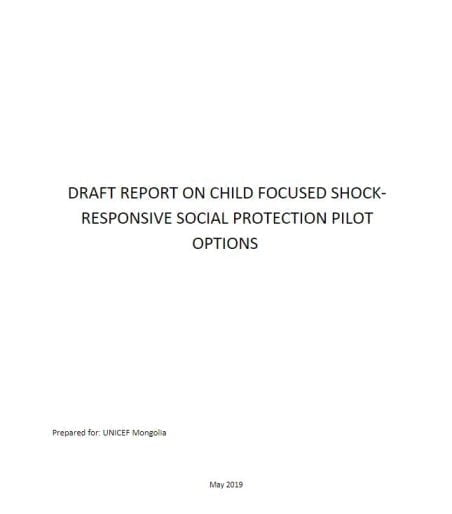Draft Report On Child Focused Shock-responsive Social Protection Pilot Options
UNICEF seeks to work together with other development partners to support the Government of Mongolia (GoM) to pilot a shock-responsive social protection (SRSP) program in order to demonstrate the value of mainstreaming SRSP into the national social protection system and to generate lessons on whether and how to scale up the pilot program.
In Mongolia, the increased frequency and severity of climate-related shocks as a result of climate change have been particularly pronounced. Nomadic herder households, who account for approximately a third of the population, are particularly vulnerable to these climate shocks, given their reliance on livestock for their livelihoods. Loss of livestock due to climate shocks is an important driver of massive rural to urban migration which has resulted in high urban unemployment and contributed significantly to dangerous levels of urban air pollution.
While the national system for disaster management, implemented through the National Emergency Management Agency (NEMA), has a number of measures in place to reduce the risk of livestock death as a result of droughts and dzuds, there are currently no explicit provisions within the social protection system to reduce risks to the welfare of vulnerable households or children arising from the growing problem of climate-driven shocks.
Research from the National Statistics Office of Mongolia (NSO) found lasting negative impacts of cyclical climate driven shocks on children’s education and health (see section 6.1). Preparedness and early action to buffer children against such effects on children’s welfare before they occur through SRSP is preferable to measures aimed at reversing these effects exiting and their economic and social consequences after they have taken their toll.
SRSP presents an opportunity to respond to seasonal and cyclical shocks in a faster and less expensive manner than the traditional humanitarian disaster response model by making use of existing social protection systems (e.g. targeting mechanisms, beneficiary databases, payment systems, human resources, monitoring mechanisms) rather than investing limited resources in new, parallel ones.



